Entrepreneurial Ventures and Small Business Management
VerifiedAdded on 2023/01/10
|12
|3487
|27
AI Summary
This document explores the different types of entrepreneurial ventures and their impact on the economy. It discusses the significance of small and scalable businesses for social and economic growth. The document also provides analytical data on the impact of micro and small businesses on the economy.
Contribute Materials
Your contribution can guide someone’s learning journey. Share your
documents today.

Unit – 9
Entrepreneurship
And
Small
Business
Management
Entrepreneurship
And
Small
Business
Management
Secure Best Marks with AI Grader
Need help grading? Try our AI Grader for instant feedback on your assignments.
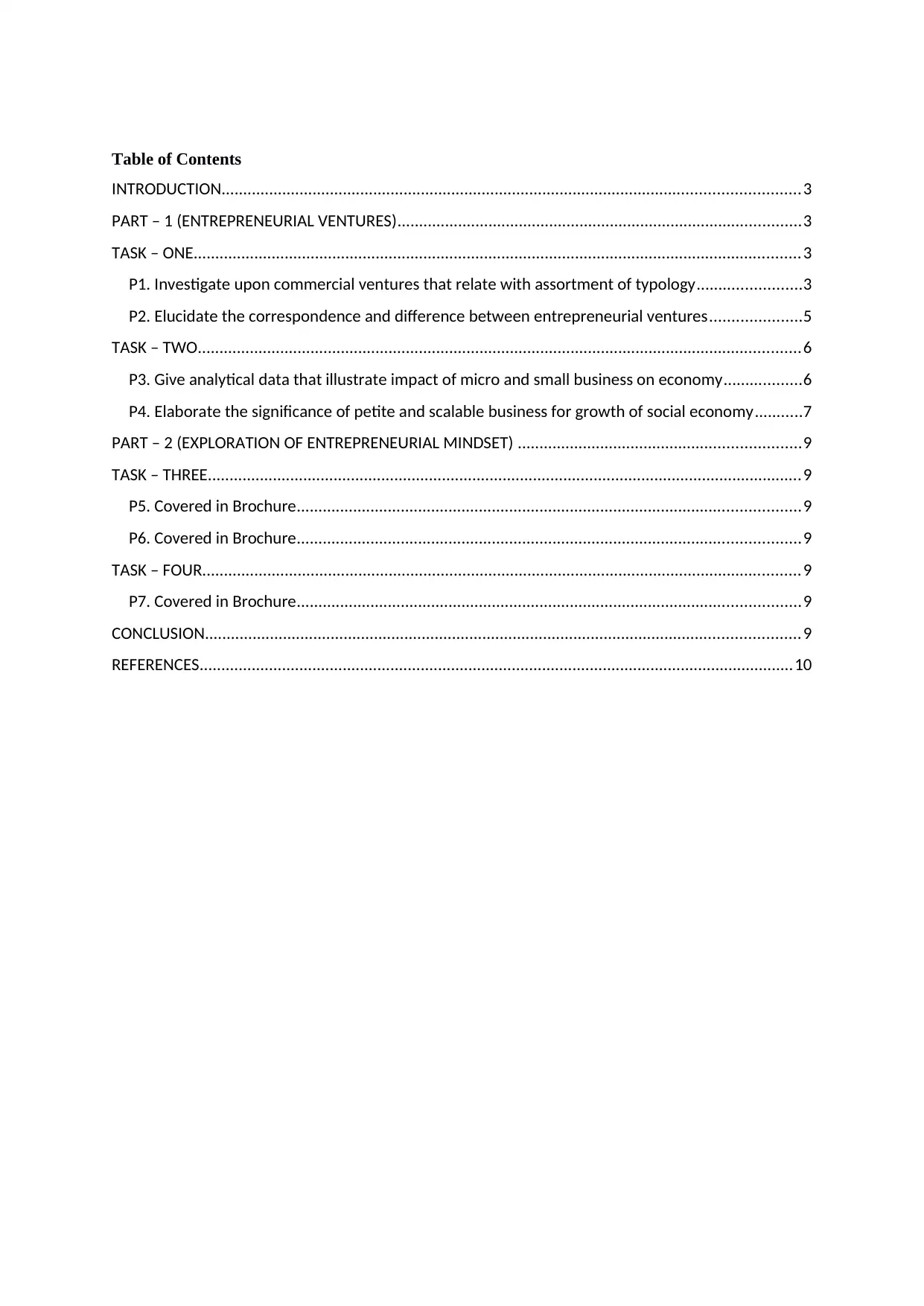
Table of Contents
INTRODUCTION.....................................................................................................................................3
PART – 1 (ENTREPRENEURIAL VENTURES).............................................................................................3
TASK – ONE............................................................................................................................................3
P1. Investigate upon commercial ventures that relate with assortment of typology........................3
P2. Elucidate the correspondence and difference between entrepreneurial ventures.....................5
TASK – TWO...........................................................................................................................................6
P3. Give analytical data that illustrate impact of micro and small business on economy..................6
P4. Elaborate the significance of petite and scalable business for growth of social economy...........7
PART – 2 (EXPLORATION OF ENTREPRENEURIAL MINDSET) .................................................................9
TASK – THREE.........................................................................................................................................9
P5. Covered in Brochure....................................................................................................................9
P6. Covered in Brochure....................................................................................................................9
TASK – FOUR..........................................................................................................................................9
P7. Covered in Brochure....................................................................................................................9
CONCLUSION.........................................................................................................................................9
REFERENCES.........................................................................................................................................10
INTRODUCTION.....................................................................................................................................3
PART – 1 (ENTREPRENEURIAL VENTURES).............................................................................................3
TASK – ONE............................................................................................................................................3
P1. Investigate upon commercial ventures that relate with assortment of typology........................3
P2. Elucidate the correspondence and difference between entrepreneurial ventures.....................5
TASK – TWO...........................................................................................................................................6
P3. Give analytical data that illustrate impact of micro and small business on economy..................6
P4. Elaborate the significance of petite and scalable business for growth of social economy...........7
PART – 2 (EXPLORATION OF ENTREPRENEURIAL MINDSET) .................................................................9
TASK – THREE.........................................................................................................................................9
P5. Covered in Brochure....................................................................................................................9
P6. Covered in Brochure....................................................................................................................9
TASK – FOUR..........................................................................................................................................9
P7. Covered in Brochure....................................................................................................................9
CONCLUSION.........................................................................................................................................9
REFERENCES.........................................................................................................................................10
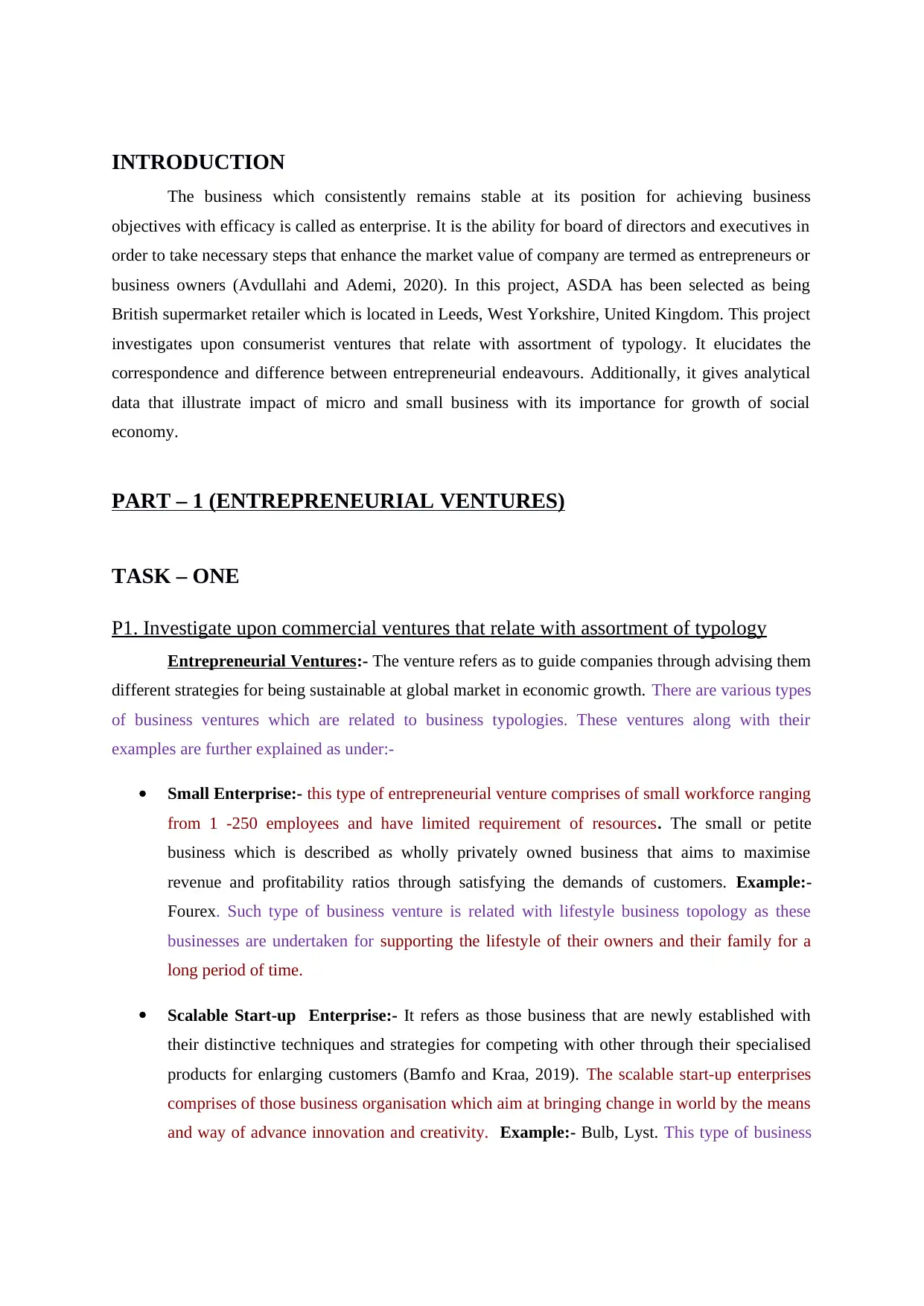
INTRODUCTION
The business which consistently remains stable at its position for achieving business
objectives with efficacy is called as enterprise. It is the ability for board of directors and executives in
order to take necessary steps that enhance the market value of company are termed as entrepreneurs or
business owners (Avdullahi and Ademi, 2020). In this project, ASDA has been selected as being
British supermarket retailer which is located in Leeds, West Yorkshire, United Kingdom. This project
investigates upon consumerist ventures that relate with assortment of typology. It elucidates the
correspondence and difference between entrepreneurial endeavours. Additionally, it gives analytical
data that illustrate impact of micro and small business with its importance for growth of social
economy.
PART – 1 (ENTREPRENEURIAL VENTURES)
TASK – ONE
P1. Investigate upon commercial ventures that relate with assortment of typology
Entrepreneurial Ventures:- The venture refers as to guide companies through advising them
different strategies for being sustainable at global market in economic growth. There are various types
of business ventures which are related to business typologies. These ventures along with their
examples are further explained as under:-
Small Enterprise:- this type of entrepreneurial venture comprises of small workforce ranging
from 1 -250 employees and have limited requirement of resources. The small or petite
business which is described as wholly privately owned business that aims to maximise
revenue and profitability ratios through satisfying the demands of customers. Example:-
Fourex. Such type of business venture is related with lifestyle business topology as these
businesses are undertaken for supporting the lifestyle of their owners and their family for a
long period of time.
Scalable Start-up Enterprise:- It refers as those business that are newly established with
their distinctive techniques and strategies for competing with other through their specialised
products for enlarging customers (Bamfo and Kraa, 2019). The scalable start-up enterprises
comprises of those business organisation which aim at bringing change in world by the means
and way of advance innovation and creativity. Example:- Bulb, Lyst. This type of business
The business which consistently remains stable at its position for achieving business
objectives with efficacy is called as enterprise. It is the ability for board of directors and executives in
order to take necessary steps that enhance the market value of company are termed as entrepreneurs or
business owners (Avdullahi and Ademi, 2020). In this project, ASDA has been selected as being
British supermarket retailer which is located in Leeds, West Yorkshire, United Kingdom. This project
investigates upon consumerist ventures that relate with assortment of typology. It elucidates the
correspondence and difference between entrepreneurial endeavours. Additionally, it gives analytical
data that illustrate impact of micro and small business with its importance for growth of social
economy.
PART – 1 (ENTREPRENEURIAL VENTURES)
TASK – ONE
P1. Investigate upon commercial ventures that relate with assortment of typology
Entrepreneurial Ventures:- The venture refers as to guide companies through advising them
different strategies for being sustainable at global market in economic growth. There are various types
of business ventures which are related to business typologies. These ventures along with their
examples are further explained as under:-
Small Enterprise:- this type of entrepreneurial venture comprises of small workforce ranging
from 1 -250 employees and have limited requirement of resources. The small or petite
business which is described as wholly privately owned business that aims to maximise
revenue and profitability ratios through satisfying the demands of customers. Example:-
Fourex. Such type of business venture is related with lifestyle business topology as these
businesses are undertaken for supporting the lifestyle of their owners and their family for a
long period of time.
Scalable Start-up Enterprise:- It refers as those business that are newly established with
their distinctive techniques and strategies for competing with other through their specialised
products for enlarging customers (Bamfo and Kraa, 2019). The scalable start-up enterprises
comprises of those business organisation which aim at bringing change in world by the means
and way of advance innovation and creativity. Example:- Bulb, Lyst. This type of business
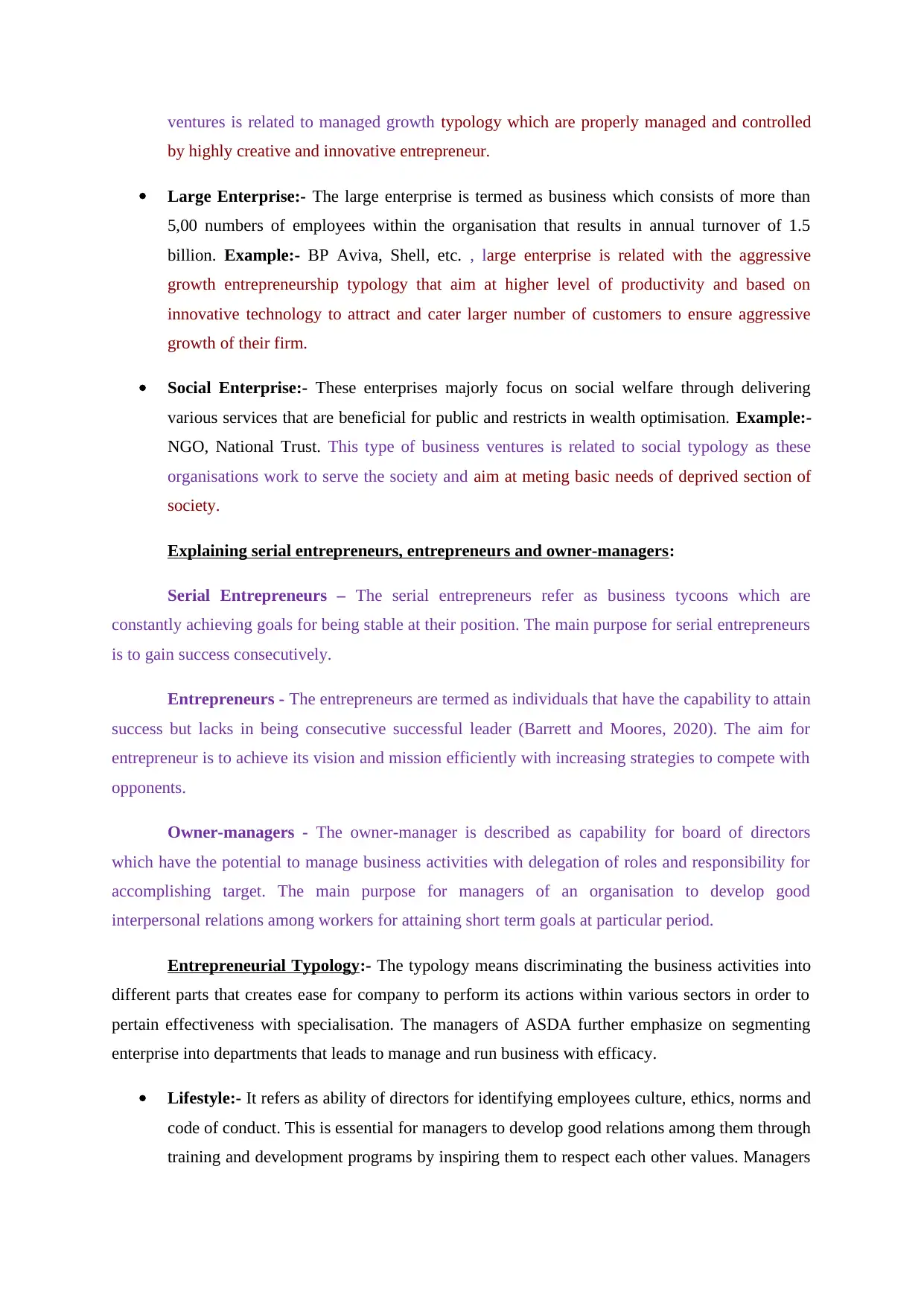
ventures is related to managed growth typology which are properly managed and controlled
by highly creative and innovative entrepreneur.
Large Enterprise:- The large enterprise is termed as business which consists of more than
5,00 numbers of employees within the organisation that results in annual turnover of 1.5
billion. Example:- BP Aviva, Shell, etc. , large enterprise is related with the aggressive
growth entrepreneurship typology that aim at higher level of productivity and based on
innovative technology to attract and cater larger number of customers to ensure aggressive
growth of their firm.
Social Enterprise:- These enterprises majorly focus on social welfare through delivering
various services that are beneficial for public and restricts in wealth optimisation. Example:-
NGO, National Trust. This type of business ventures is related to social typology as these
organisations work to serve the society and aim at meting basic needs of deprived section of
society.
Explaining serial entrepreneurs, entrepreneurs and owner-managers:
Serial Entrepreneurs – The serial entrepreneurs refer as business tycoons which are
constantly achieving goals for being stable at their position. The main purpose for serial entrepreneurs
is to gain success consecutively.
Entrepreneurs - The entrepreneurs are termed as individuals that have the capability to attain
success but lacks in being consecutive successful leader (Barrett and Moores, 2020). The aim for
entrepreneur is to achieve its vision and mission efficiently with increasing strategies to compete with
opponents.
Owner-managers - The owner-manager is described as capability for board of directors
which have the potential to manage business activities with delegation of roles and responsibility for
accomplishing target. The main purpose for managers of an organisation to develop good
interpersonal relations among workers for attaining short term goals at particular period.
Entrepreneurial Typology:- The typology means discriminating the business activities into
different parts that creates ease for company to perform its actions within various sectors in order to
pertain effectiveness with specialisation. The managers of ASDA further emphasize on segmenting
enterprise into departments that leads to manage and run business with efficacy.
Lifestyle:- It refers as ability of directors for identifying employees culture, ethics, norms and
code of conduct. This is essential for managers to develop good relations among them through
training and development programs by inspiring them to respect each other values. Managers
by highly creative and innovative entrepreneur.
Large Enterprise:- The large enterprise is termed as business which consists of more than
5,00 numbers of employees within the organisation that results in annual turnover of 1.5
billion. Example:- BP Aviva, Shell, etc. , large enterprise is related with the aggressive
growth entrepreneurship typology that aim at higher level of productivity and based on
innovative technology to attract and cater larger number of customers to ensure aggressive
growth of their firm.
Social Enterprise:- These enterprises majorly focus on social welfare through delivering
various services that are beneficial for public and restricts in wealth optimisation. Example:-
NGO, National Trust. This type of business ventures is related to social typology as these
organisations work to serve the society and aim at meting basic needs of deprived section of
society.
Explaining serial entrepreneurs, entrepreneurs and owner-managers:
Serial Entrepreneurs – The serial entrepreneurs refer as business tycoons which are
constantly achieving goals for being stable at their position. The main purpose for serial entrepreneurs
is to gain success consecutively.
Entrepreneurs - The entrepreneurs are termed as individuals that have the capability to attain
success but lacks in being consecutive successful leader (Barrett and Moores, 2020). The aim for
entrepreneur is to achieve its vision and mission efficiently with increasing strategies to compete with
opponents.
Owner-managers - The owner-manager is described as capability for board of directors
which have the potential to manage business activities with delegation of roles and responsibility for
accomplishing target. The main purpose for managers of an organisation to develop good
interpersonal relations among workers for attaining short term goals at particular period.
Entrepreneurial Typology:- The typology means discriminating the business activities into
different parts that creates ease for company to perform its actions within various sectors in order to
pertain effectiveness with specialisation. The managers of ASDA further emphasize on segmenting
enterprise into departments that leads to manage and run business with efficacy.
Lifestyle:- It refers as ability of directors for identifying employees culture, ethics, norms and
code of conduct. This is essential for managers to develop good relations among them through
training and development programs by inspiring them to respect each other values. Managers
Secure Best Marks with AI Grader
Need help grading? Try our AI Grader for instant feedback on your assignments.
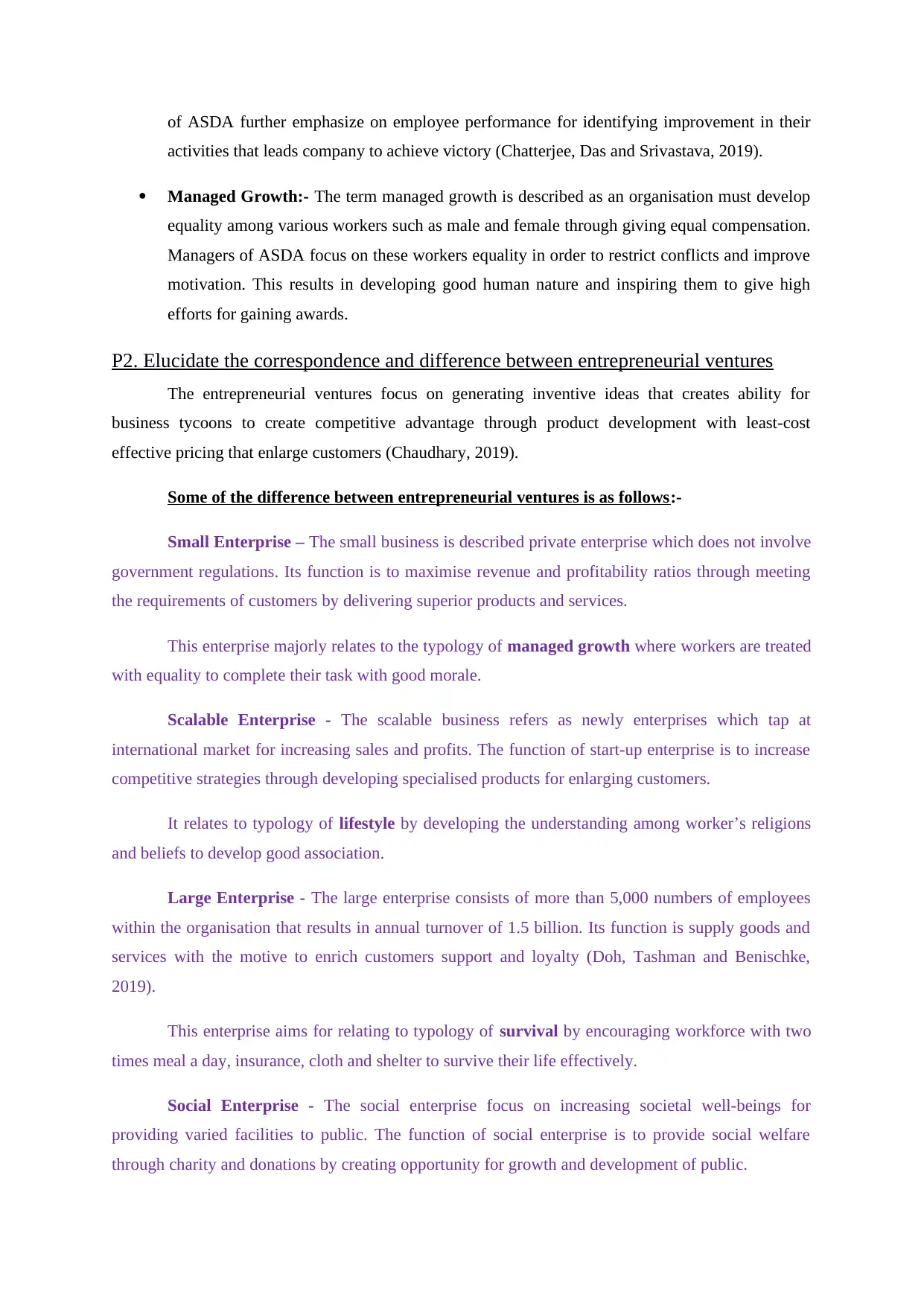
of ASDA further emphasize on employee performance for identifying improvement in their
activities that leads company to achieve victory (Chatterjee, Das and Srivastava, 2019).
Managed Growth:- The term managed growth is described as an organisation must develop
equality among various workers such as male and female through giving equal compensation.
Managers of ASDA focus on these workers equality in order to restrict conflicts and improve
motivation. This results in developing good human nature and inspiring them to give high
efforts for gaining awards.
P2. Elucidate the correspondence and difference between entrepreneurial ventures
The entrepreneurial ventures focus on generating inventive ideas that creates ability for
business tycoons to create competitive advantage through product development with least-cost
effective pricing that enlarge customers (Chaudhary, 2019).
Some of the difference between entrepreneurial ventures is as follows:-
Small Enterprise – The small business is described private enterprise which does not involve
government regulations. Its function is to maximise revenue and profitability ratios through meeting
the requirements of customers by delivering superior products and services.
This enterprise majorly relates to the typology of managed growth where workers are treated
with equality to complete their task with good morale.
Scalable Enterprise - The scalable business refers as newly enterprises which tap at
international market for increasing sales and profits. The function of start-up enterprise is to increase
competitive strategies through developing specialised products for enlarging customers.
It relates to typology of lifestyle by developing the understanding among worker’s religions
and beliefs to develop good association.
Large Enterprise - The large enterprise consists of more than 5,000 numbers of employees
within the organisation that results in annual turnover of 1.5 billion. Its function is supply goods and
services with the motive to enrich customers support and loyalty (Doh, Tashman and Benischke,
2019).
This enterprise aims for relating to typology of survival by encouraging workforce with two
times meal a day, insurance, cloth and shelter to survive their life effectively.
Social Enterprise - The social enterprise focus on increasing societal well-beings for
providing varied facilities to public. The function of social enterprise is to provide social welfare
through charity and donations by creating opportunity for growth and development of public.
activities that leads company to achieve victory (Chatterjee, Das and Srivastava, 2019).
Managed Growth:- The term managed growth is described as an organisation must develop
equality among various workers such as male and female through giving equal compensation.
Managers of ASDA focus on these workers equality in order to restrict conflicts and improve
motivation. This results in developing good human nature and inspiring them to give high
efforts for gaining awards.
P2. Elucidate the correspondence and difference between entrepreneurial ventures
The entrepreneurial ventures focus on generating inventive ideas that creates ability for
business tycoons to create competitive advantage through product development with least-cost
effective pricing that enlarge customers (Chaudhary, 2019).
Some of the difference between entrepreneurial ventures is as follows:-
Small Enterprise – The small business is described private enterprise which does not involve
government regulations. Its function is to maximise revenue and profitability ratios through meeting
the requirements of customers by delivering superior products and services.
This enterprise majorly relates to the typology of managed growth where workers are treated
with equality to complete their task with good morale.
Scalable Enterprise - The scalable business refers as newly enterprises which tap at
international market for increasing sales and profits. The function of start-up enterprise is to increase
competitive strategies through developing specialised products for enlarging customers.
It relates to typology of lifestyle by developing the understanding among worker’s religions
and beliefs to develop good association.
Large Enterprise - The large enterprise consists of more than 5,000 numbers of employees
within the organisation that results in annual turnover of 1.5 billion. Its function is supply goods and
services with the motive to enrich customers support and loyalty (Doh, Tashman and Benischke,
2019).
This enterprise aims for relating to typology of survival by encouraging workforce with two
times meal a day, insurance, cloth and shelter to survive their life effectively.
Social Enterprise - The social enterprise focus on increasing societal well-beings for
providing varied facilities to public. The function of social enterprise is to provide social welfare
through charity and donations by creating opportunity for growth and development of public.
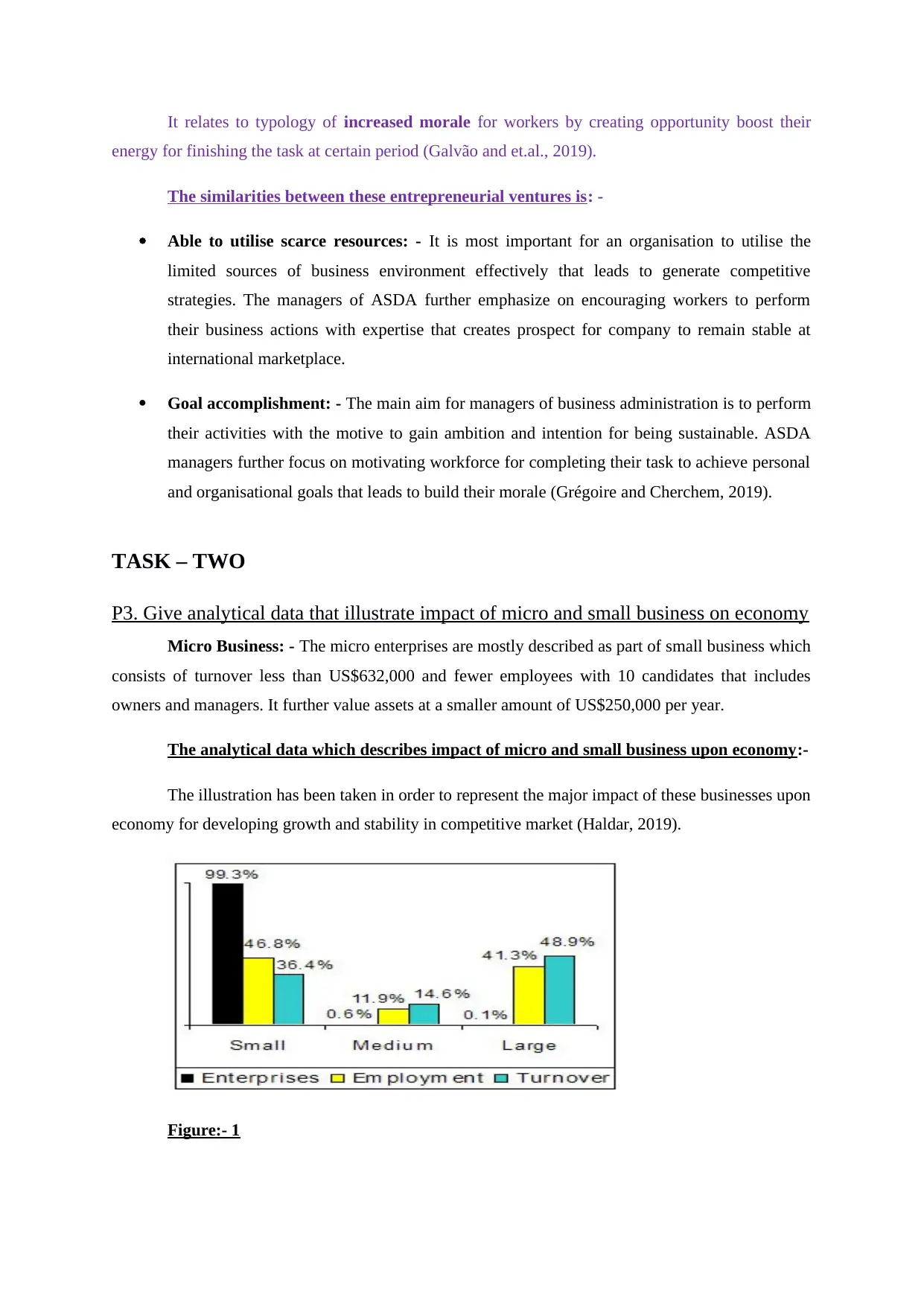
It relates to typology of increased morale for workers by creating opportunity boost their
energy for finishing the task at certain period (Galvão and et.al., 2019).
The similarities between these entrepreneurial ventures is: -
Able to utilise scarce resources: - It is most important for an organisation to utilise the
limited sources of business environment effectively that leads to generate competitive
strategies. The managers of ASDA further emphasize on encouraging workers to perform
their business actions with expertise that creates prospect for company to remain stable at
international marketplace.
Goal accomplishment: - The main aim for managers of business administration is to perform
their activities with the motive to gain ambition and intention for being sustainable. ASDA
managers further focus on motivating workforce for completing their task to achieve personal
and organisational goals that leads to build their morale (Grégoire and Cherchem, 2019).
TASK – TWO
P3. Give analytical data that illustrate impact of micro and small business on economy
Micro Business: - The micro enterprises are mostly described as part of small business which
consists of turnover less than US$632,000 and fewer employees with 10 candidates that includes
owners and managers. It further value assets at a smaller amount of US$250,000 per year.
The analytical data which describes impact of micro and small business upon economy:-
The illustration has been taken in order to represent the major impact of these businesses upon
economy for developing growth and stability in competitive market (Haldar, 2019).
Figure:- 1
energy for finishing the task at certain period (Galvão and et.al., 2019).
The similarities between these entrepreneurial ventures is: -
Able to utilise scarce resources: - It is most important for an organisation to utilise the
limited sources of business environment effectively that leads to generate competitive
strategies. The managers of ASDA further emphasize on encouraging workers to perform
their business actions with expertise that creates prospect for company to remain stable at
international marketplace.
Goal accomplishment: - The main aim for managers of business administration is to perform
their activities with the motive to gain ambition and intention for being sustainable. ASDA
managers further focus on motivating workforce for completing their task to achieve personal
and organisational goals that leads to build their morale (Grégoire and Cherchem, 2019).
TASK – TWO
P3. Give analytical data that illustrate impact of micro and small business on economy
Micro Business: - The micro enterprises are mostly described as part of small business which
consists of turnover less than US$632,000 and fewer employees with 10 candidates that includes
owners and managers. It further value assets at a smaller amount of US$250,000 per year.
The analytical data which describes impact of micro and small business upon economy:-
The illustration has been taken in order to represent the major impact of these businesses upon
economy for developing growth and stability in competitive market (Haldar, 2019).
Figure:- 1
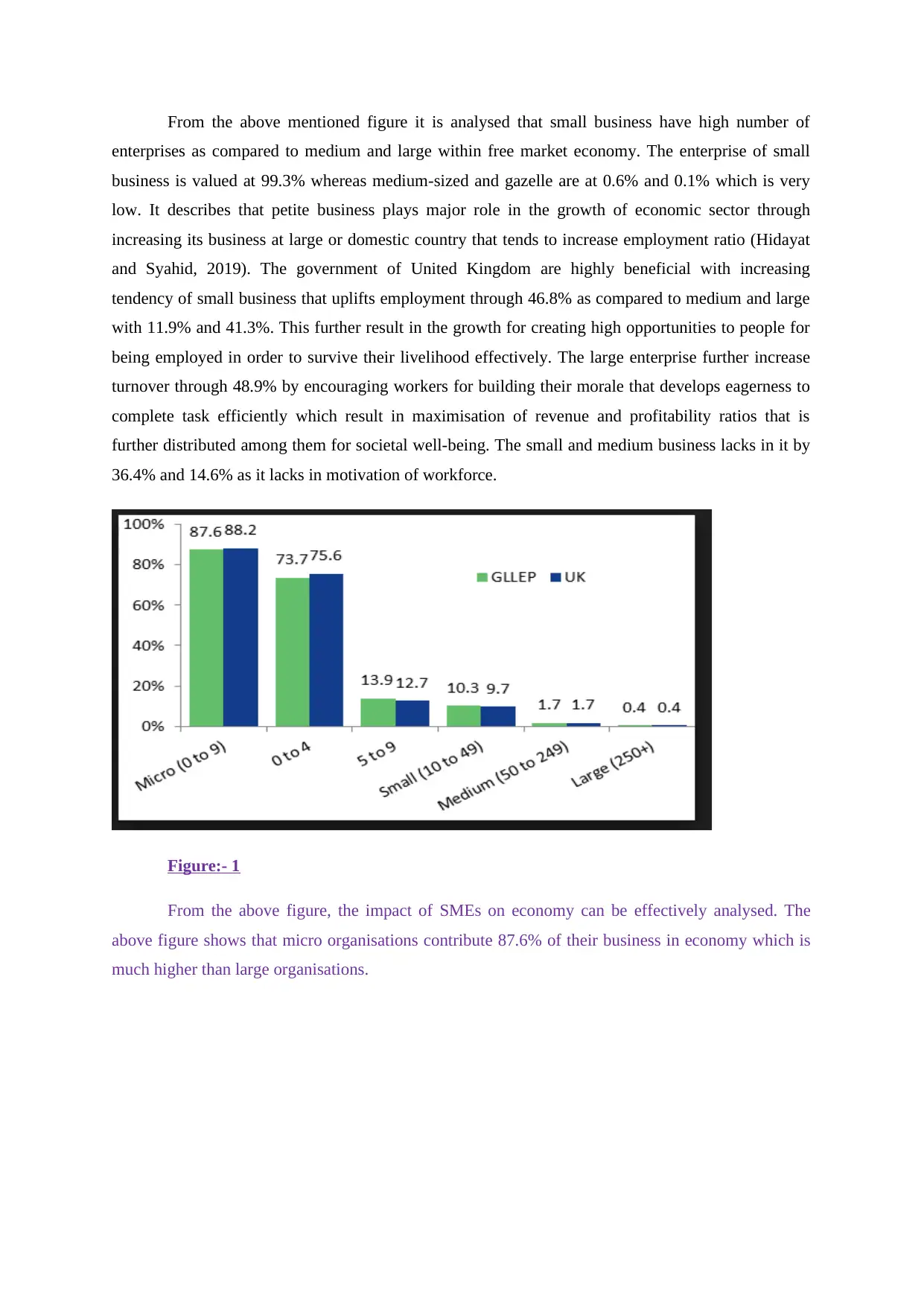
From the above mentioned figure it is analysed that small business have high number of
enterprises as compared to medium and large within free market economy. The enterprise of small
business is valued at 99.3% whereas medium-sized and gazelle are at 0.6% and 0.1% which is very
low. It describes that petite business plays major role in the growth of economic sector through
increasing its business at large or domestic country that tends to increase employment ratio (Hidayat
and Syahid, 2019). The government of United Kingdom are highly beneficial with increasing
tendency of small business that uplifts employment through 46.8% as compared to medium and large
with 11.9% and 41.3%. This further result in the growth for creating high opportunities to people for
being employed in order to survive their livelihood effectively. The large enterprise further increase
turnover through 48.9% by encouraging workers for building their morale that develops eagerness to
complete task efficiently which result in maximisation of revenue and profitability ratios that is
further distributed among them for societal well-being. The small and medium business lacks in it by
36.4% and 14.6% as it lacks in motivation of workforce.
Figure:- 1
From the above figure, the impact of SMEs on economy can be effectively analysed. The
above figure shows that micro organisations contribute 87.6% of their business in economy which is
much higher than large organisations.
enterprises as compared to medium and large within free market economy. The enterprise of small
business is valued at 99.3% whereas medium-sized and gazelle are at 0.6% and 0.1% which is very
low. It describes that petite business plays major role in the growth of economic sector through
increasing its business at large or domestic country that tends to increase employment ratio (Hidayat
and Syahid, 2019). The government of United Kingdom are highly beneficial with increasing
tendency of small business that uplifts employment through 46.8% as compared to medium and large
with 11.9% and 41.3%. This further result in the growth for creating high opportunities to people for
being employed in order to survive their livelihood effectively. The large enterprise further increase
turnover through 48.9% by encouraging workers for building their morale that develops eagerness to
complete task efficiently which result in maximisation of revenue and profitability ratios that is
further distributed among them for societal well-being. The small and medium business lacks in it by
36.4% and 14.6% as it lacks in motivation of workforce.
Figure:- 1
From the above figure, the impact of SMEs on economy can be effectively analysed. The
above figure shows that micro organisations contribute 87.6% of their business in economy which is
much higher than large organisations.
Paraphrase This Document
Need a fresh take? Get an instant paraphrase of this document with our AI Paraphraser
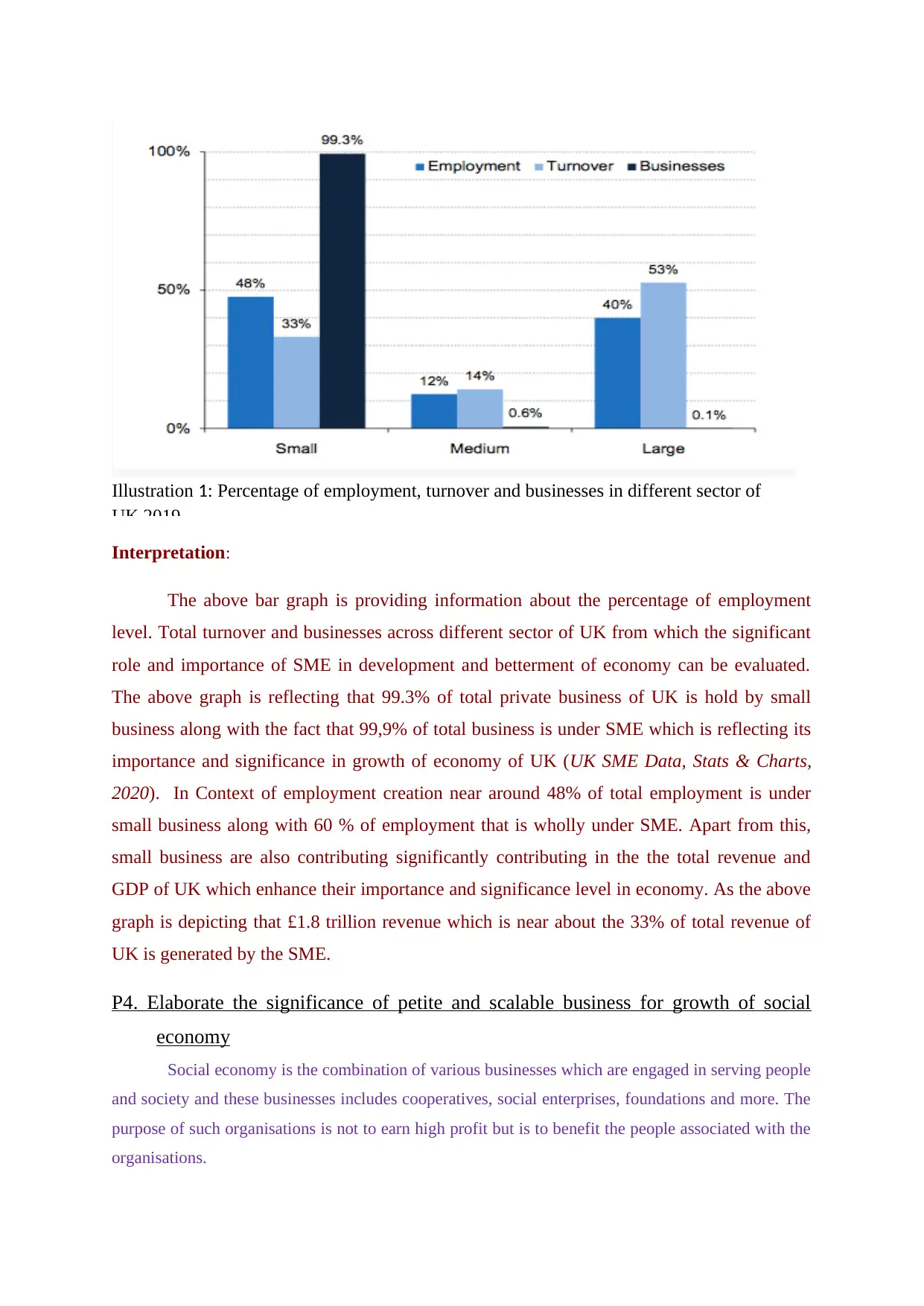
Illustration 1: Percentage of employment, turnover and businesses in different sector of
UK,2019
Interpretation:
The above bar graph is providing information about the percentage of employment
level. Total turnover and businesses across different sector of UK from which the significant
role and importance of SME in development and betterment of economy can be evaluated.
The above graph is reflecting that 99.3% of total private business of UK is hold by small
business along with the fact that 99,9% of total business is under SME which is reflecting its
importance and significance in growth of economy of UK (UK SME Data, Stats & Charts,
2020). In Context of employment creation near around 48% of total employment is under
small business along with 60 % of employment that is wholly under SME. Apart from this,
small business are also contributing significantly contributing in the the total revenue and
GDP of UK which enhance their importance and significance level in economy. As the above
graph is depicting that £1.8 trillion revenue which is near about the 33% of total revenue of
UK is generated by the SME.
P4. Elaborate the significance of petite and scalable business for growth of social
economy
Social economy is the combination of various businesses which are engaged in serving people
and society and these businesses includes cooperatives, social enterprises, foundations and more. The
purpose of such organisations is not to earn high profit but is to benefit the people associated with the
organisations.
UK,2019
Interpretation:
The above bar graph is providing information about the percentage of employment
level. Total turnover and businesses across different sector of UK from which the significant
role and importance of SME in development and betterment of economy can be evaluated.
The above graph is reflecting that 99.3% of total private business of UK is hold by small
business along with the fact that 99,9% of total business is under SME which is reflecting its
importance and significance in growth of economy of UK (UK SME Data, Stats & Charts,
2020). In Context of employment creation near around 48% of total employment is under
small business along with 60 % of employment that is wholly under SME. Apart from this,
small business are also contributing significantly contributing in the the total revenue and
GDP of UK which enhance their importance and significance level in economy. As the above
graph is depicting that £1.8 trillion revenue which is near about the 33% of total revenue of
UK is generated by the SME.
P4. Elaborate the significance of petite and scalable business for growth of social
economy
Social economy is the combination of various businesses which are engaged in serving people
and society and these businesses includes cooperatives, social enterprises, foundations and more. The
purpose of such organisations is not to earn high profit but is to benefit the people associated with the
organisations.
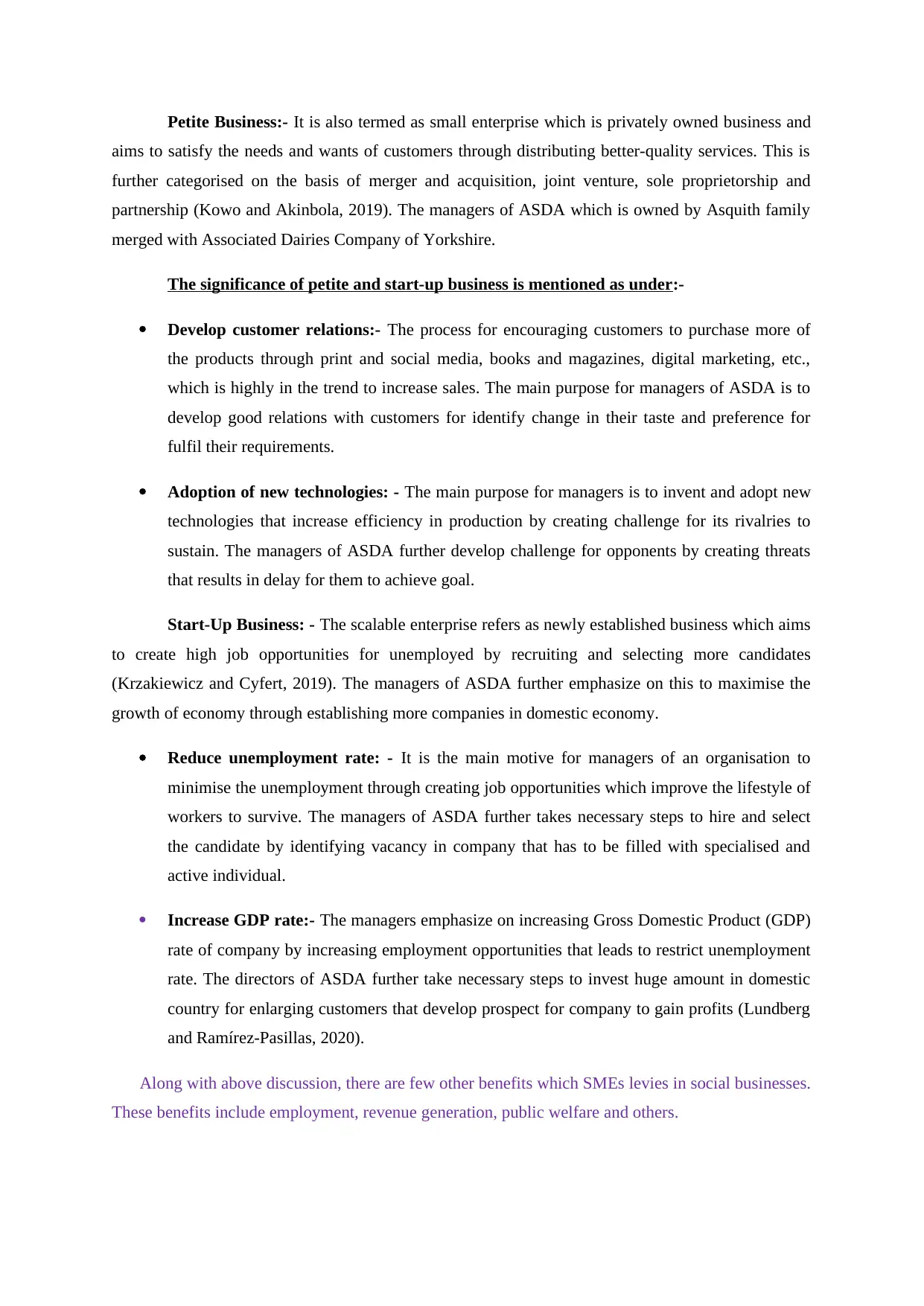
Petite Business:- It is also termed as small enterprise which is privately owned business and
aims to satisfy the needs and wants of customers through distributing better-quality services. This is
further categorised on the basis of merger and acquisition, joint venture, sole proprietorship and
partnership (Kowo and Akinbola, 2019). The managers of ASDA which is owned by Asquith family
merged with Associated Dairies Company of Yorkshire.
The significance of petite and start-up business is mentioned as under:-
Develop customer relations:- The process for encouraging customers to purchase more of
the products through print and social media, books and magazines, digital marketing, etc.,
which is highly in the trend to increase sales. The main purpose for managers of ASDA is to
develop good relations with customers for identify change in their taste and preference for
fulfil their requirements.
Adoption of new technologies: - The main purpose for managers is to invent and adopt new
technologies that increase efficiency in production by creating challenge for its rivalries to
sustain. The managers of ASDA further develop challenge for opponents by creating threats
that results in delay for them to achieve goal.
Start-Up Business: - The scalable enterprise refers as newly established business which aims
to create high job opportunities for unemployed by recruiting and selecting more candidates
(Krzakiewicz and Cyfert, 2019). The managers of ASDA further emphasize on this to maximise the
growth of economy through establishing more companies in domestic economy.
Reduce unemployment rate: - It is the main motive for managers of an organisation to
minimise the unemployment through creating job opportunities which improve the lifestyle of
workers to survive. The managers of ASDA further takes necessary steps to hire and select
the candidate by identifying vacancy in company that has to be filled with specialised and
active individual.
Increase GDP rate:- The managers emphasize on increasing Gross Domestic Product (GDP)
rate of company by increasing employment opportunities that leads to restrict unemployment
rate. The directors of ASDA further take necessary steps to invest huge amount in domestic
country for enlarging customers that develop prospect for company to gain profits (Lundberg
and Ramírez-Pasillas, 2020).
Along with above discussion, there are few other benefits which SMEs levies in social businesses.
These benefits include employment, revenue generation, public welfare and others.
aims to satisfy the needs and wants of customers through distributing better-quality services. This is
further categorised on the basis of merger and acquisition, joint venture, sole proprietorship and
partnership (Kowo and Akinbola, 2019). The managers of ASDA which is owned by Asquith family
merged with Associated Dairies Company of Yorkshire.
The significance of petite and start-up business is mentioned as under:-
Develop customer relations:- The process for encouraging customers to purchase more of
the products through print and social media, books and magazines, digital marketing, etc.,
which is highly in the trend to increase sales. The main purpose for managers of ASDA is to
develop good relations with customers for identify change in their taste and preference for
fulfil their requirements.
Adoption of new technologies: - The main purpose for managers is to invent and adopt new
technologies that increase efficiency in production by creating challenge for its rivalries to
sustain. The managers of ASDA further develop challenge for opponents by creating threats
that results in delay for them to achieve goal.
Start-Up Business: - The scalable enterprise refers as newly established business which aims
to create high job opportunities for unemployed by recruiting and selecting more candidates
(Krzakiewicz and Cyfert, 2019). The managers of ASDA further emphasize on this to maximise the
growth of economy through establishing more companies in domestic economy.
Reduce unemployment rate: - It is the main motive for managers of an organisation to
minimise the unemployment through creating job opportunities which improve the lifestyle of
workers to survive. The managers of ASDA further takes necessary steps to hire and select
the candidate by identifying vacancy in company that has to be filled with specialised and
active individual.
Increase GDP rate:- The managers emphasize on increasing Gross Domestic Product (GDP)
rate of company by increasing employment opportunities that leads to restrict unemployment
rate. The directors of ASDA further take necessary steps to invest huge amount in domestic
country for enlarging customers that develop prospect for company to gain profits (Lundberg
and Ramírez-Pasillas, 2020).
Along with above discussion, there are few other benefits which SMEs levies in social businesses.
These benefits include employment, revenue generation, public welfare and others.
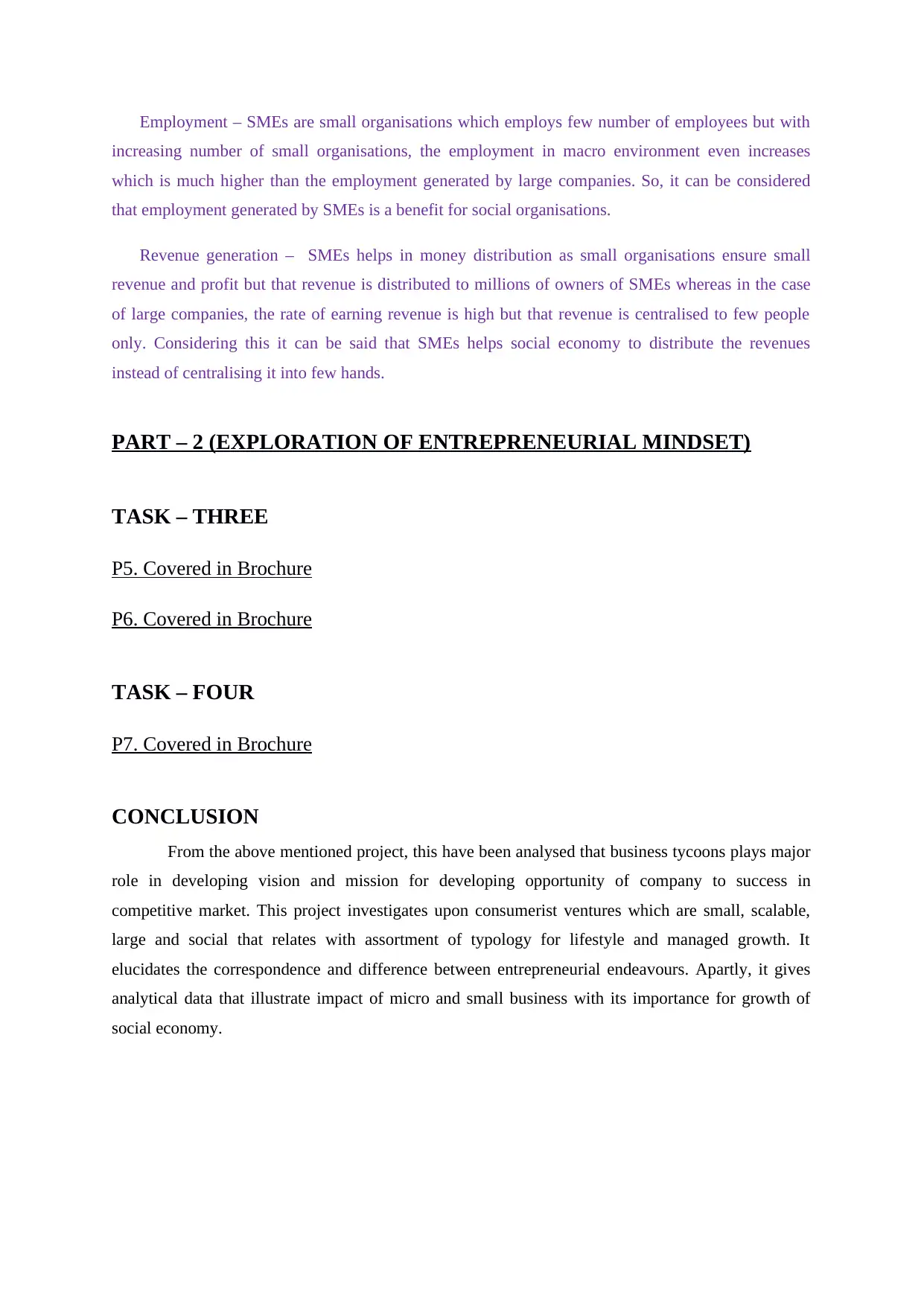
Employment – SMEs are small organisations which employs few number of employees but with
increasing number of small organisations, the employment in macro environment even increases
which is much higher than the employment generated by large companies. So, it can be considered
that employment generated by SMEs is a benefit for social organisations.
Revenue generation – SMEs helps in money distribution as small organisations ensure small
revenue and profit but that revenue is distributed to millions of owners of SMEs whereas in the case
of large companies, the rate of earning revenue is high but that revenue is centralised to few people
only. Considering this it can be said that SMEs helps social economy to distribute the revenues
instead of centralising it into few hands.
PART – 2 (EXPLORATION OF ENTREPRENEURIAL MINDSET)
TASK – THREE
P5. Covered in Brochure
P6. Covered in Brochure
TASK – FOUR
P7. Covered in Brochure
CONCLUSION
From the above mentioned project, this have been analysed that business tycoons plays major
role in developing vision and mission for developing opportunity of company to success in
competitive market. This project investigates upon consumerist ventures which are small, scalable,
large and social that relates with assortment of typology for lifestyle and managed growth. It
elucidates the correspondence and difference between entrepreneurial endeavours. Apartly, it gives
analytical data that illustrate impact of micro and small business with its importance for growth of
social economy.
increasing number of small organisations, the employment in macro environment even increases
which is much higher than the employment generated by large companies. So, it can be considered
that employment generated by SMEs is a benefit for social organisations.
Revenue generation – SMEs helps in money distribution as small organisations ensure small
revenue and profit but that revenue is distributed to millions of owners of SMEs whereas in the case
of large companies, the rate of earning revenue is high but that revenue is centralised to few people
only. Considering this it can be said that SMEs helps social economy to distribute the revenues
instead of centralising it into few hands.
PART – 2 (EXPLORATION OF ENTREPRENEURIAL MINDSET)
TASK – THREE
P5. Covered in Brochure
P6. Covered in Brochure
TASK – FOUR
P7. Covered in Brochure
CONCLUSION
From the above mentioned project, this have been analysed that business tycoons plays major
role in developing vision and mission for developing opportunity of company to success in
competitive market. This project investigates upon consumerist ventures which are small, scalable,
large and social that relates with assortment of typology for lifestyle and managed growth. It
elucidates the correspondence and difference between entrepreneurial endeavours. Apartly, it gives
analytical data that illustrate impact of micro and small business with its importance for growth of
social economy.
Secure Best Marks with AI Grader
Need help grading? Try our AI Grader for instant feedback on your assignments.
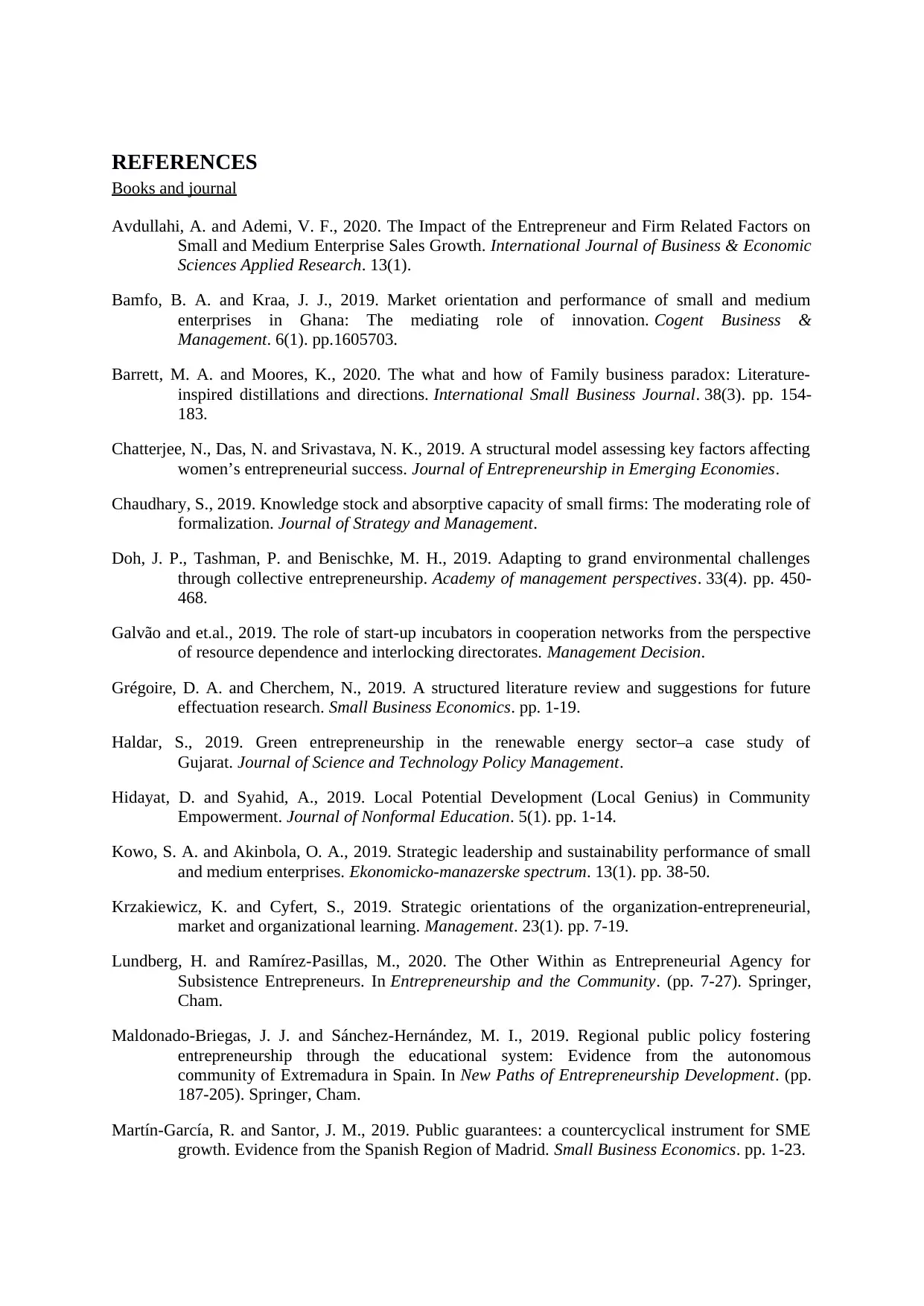
REFERENCES
Books and journal
Avdullahi, A. and Ademi, V. F., 2020. The Impact of the Entrepreneur and Firm Related Factors on
Small and Medium Enterprise Sales Growth. International Journal of Business & Economic
Sciences Applied Research. 13(1).
Bamfo, B. A. and Kraa, J. J., 2019. Market orientation and performance of small and medium
enterprises in Ghana: The mediating role of innovation. Cogent Business &
Management. 6(1). pp.1605703.
Barrett, M. A. and Moores, K., 2020. The what and how of Family business paradox: Literature-
inspired distillations and directions. International Small Business Journal. 38(3). pp. 154-
183.
Chatterjee, N., Das, N. and Srivastava, N. K., 2019. A structural model assessing key factors affecting
women’s entrepreneurial success. Journal of Entrepreneurship in Emerging Economies.
Chaudhary, S., 2019. Knowledge stock and absorptive capacity of small firms: The moderating role of
formalization. Journal of Strategy and Management.
Doh, J. P., Tashman, P. and Benischke, M. H., 2019. Adapting to grand environmental challenges
through collective entrepreneurship. Academy of management perspectives. 33(4). pp. 450-
468.
Galvão and et.al., 2019. The role of start-up incubators in cooperation networks from the perspective
of resource dependence and interlocking directorates. Management Decision.
Grégoire, D. A. and Cherchem, N., 2019. A structured literature review and suggestions for future
effectuation research. Small Business Economics. pp. 1-19.
Haldar, S., 2019. Green entrepreneurship in the renewable energy sector–a case study of
Gujarat. Journal of Science and Technology Policy Management.
Hidayat, D. and Syahid, A., 2019. Local Potential Development (Local Genius) in Community
Empowerment. Journal of Nonformal Education. 5(1). pp. 1-14.
Kowo, S. A. and Akinbola, O. A., 2019. Strategic leadership and sustainability performance of small
and medium enterprises. Ekonomicko-manazerske spectrum. 13(1). pp. 38-50.
Krzakiewicz, K. and Cyfert, S., 2019. Strategic orientations of the organization-entrepreneurial,
market and organizational learning. Management. 23(1). pp. 7-19.
Lundberg, H. and Ramírez-Pasillas, M., 2020. The Other Within as Entrepreneurial Agency for
Subsistence Entrepreneurs. In Entrepreneurship and the Community. (pp. 7-27). Springer,
Cham.
Maldonado-Briegas, J. J. and Sánchez-Hernández, M. I., 2019. Regional public policy fostering
entrepreneurship through the educational system: Evidence from the autonomous
community of Extremadura in Spain. In New Paths of Entrepreneurship Development. (pp.
187-205). Springer, Cham.
Martín-García, R. and Santor, J. M., 2019. Public guarantees: a countercyclical instrument for SME
growth. Evidence from the Spanish Region of Madrid. Small Business Economics. pp. 1-23.
Books and journal
Avdullahi, A. and Ademi, V. F., 2020. The Impact of the Entrepreneur and Firm Related Factors on
Small and Medium Enterprise Sales Growth. International Journal of Business & Economic
Sciences Applied Research. 13(1).
Bamfo, B. A. and Kraa, J. J., 2019. Market orientation and performance of small and medium
enterprises in Ghana: The mediating role of innovation. Cogent Business &
Management. 6(1). pp.1605703.
Barrett, M. A. and Moores, K., 2020. The what and how of Family business paradox: Literature-
inspired distillations and directions. International Small Business Journal. 38(3). pp. 154-
183.
Chatterjee, N., Das, N. and Srivastava, N. K., 2019. A structural model assessing key factors affecting
women’s entrepreneurial success. Journal of Entrepreneurship in Emerging Economies.
Chaudhary, S., 2019. Knowledge stock and absorptive capacity of small firms: The moderating role of
formalization. Journal of Strategy and Management.
Doh, J. P., Tashman, P. and Benischke, M. H., 2019. Adapting to grand environmental challenges
through collective entrepreneurship. Academy of management perspectives. 33(4). pp. 450-
468.
Galvão and et.al., 2019. The role of start-up incubators in cooperation networks from the perspective
of resource dependence and interlocking directorates. Management Decision.
Grégoire, D. A. and Cherchem, N., 2019. A structured literature review and suggestions for future
effectuation research. Small Business Economics. pp. 1-19.
Haldar, S., 2019. Green entrepreneurship in the renewable energy sector–a case study of
Gujarat. Journal of Science and Technology Policy Management.
Hidayat, D. and Syahid, A., 2019. Local Potential Development (Local Genius) in Community
Empowerment. Journal of Nonformal Education. 5(1). pp. 1-14.
Kowo, S. A. and Akinbola, O. A., 2019. Strategic leadership and sustainability performance of small
and medium enterprises. Ekonomicko-manazerske spectrum. 13(1). pp. 38-50.
Krzakiewicz, K. and Cyfert, S., 2019. Strategic orientations of the organization-entrepreneurial,
market and organizational learning. Management. 23(1). pp. 7-19.
Lundberg, H. and Ramírez-Pasillas, M., 2020. The Other Within as Entrepreneurial Agency for
Subsistence Entrepreneurs. In Entrepreneurship and the Community. (pp. 7-27). Springer,
Cham.
Maldonado-Briegas, J. J. and Sánchez-Hernández, M. I., 2019. Regional public policy fostering
entrepreneurship through the educational system: Evidence from the autonomous
community of Extremadura in Spain. In New Paths of Entrepreneurship Development. (pp.
187-205). Springer, Cham.
Martín-García, R. and Santor, J. M., 2019. Public guarantees: a countercyclical instrument for SME
growth. Evidence from the Spanish Region of Madrid. Small Business Economics. pp. 1-23.

Presutti, M. and Odorici, V., 2019. Linking entrepreneurial and market orientation to the SME’s
performance growth: the moderating role of entrepreneurial experience and
networks. International Entrepreneurship and Management Journal. 15(3). pp. 697-720.
Sutter, C., Bruton, G. D. and Chen, J., 2019. Entrepreneurship as a solution to extreme poverty: A
review and future research directions. Journal of Business Venturing. 34(1). pp. 197-214.
Thomas, N., Randolph, A. and Marin, A., 2019. A network view of entrepreneurial cognition in
corporate entrepreneurship contexts. Management Decision.
Online:
UK SME Data, Stats & Charts. 2020. [Online]. Available Through:
<https://www.merchantsavvy.co.uk/uk-sme-data-stats-charts/>
performance growth: the moderating role of entrepreneurial experience and
networks. International Entrepreneurship and Management Journal. 15(3). pp. 697-720.
Sutter, C., Bruton, G. D. and Chen, J., 2019. Entrepreneurship as a solution to extreme poverty: A
review and future research directions. Journal of Business Venturing. 34(1). pp. 197-214.
Thomas, N., Randolph, A. and Marin, A., 2019. A network view of entrepreneurial cognition in
corporate entrepreneurship contexts. Management Decision.
Online:
UK SME Data, Stats & Charts. 2020. [Online]. Available Through:
<https://www.merchantsavvy.co.uk/uk-sme-data-stats-charts/>
1 out of 12
Related Documents
Your All-in-One AI-Powered Toolkit for Academic Success.
+13062052269
info@desklib.com
Available 24*7 on WhatsApp / Email
![[object Object]](/_next/static/media/star-bottom.7253800d.svg)
Unlock your academic potential
© 2024 | Zucol Services PVT LTD | All rights reserved.


